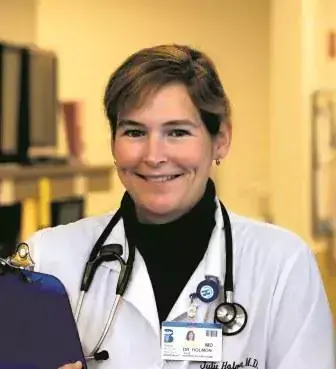High Quality Care For Patients
Beebe's Hospital Medicine team provides high-quality, immediate care for those in the hospital. Hospitalists at Beebe Healthcare are physicians who are board certified in internal medicine and specialize in patients who must receive care in the hospital. They are in the hospital 24/7, so a patient needing a physician can have one at the bedside immediately, whether it is to be admitted to the hospital or in an emergency day or night.
In the past, primary care physicians would visit their patients in the hospital. However, as primary care practices become busier and may be located farther from the hospital, hospitalists are filling the need for increased physician presence at the hospital.
Hospital At Home
We bring the hospital to you. Beebe's Hospital at Home Program allows you to be treated for your medical condition in the comfort of your own home as a substitute for traditional inpatient care.
Beebe Healthcare doctors and nurses will provide the care you need. In addition, your care team may include nurse practitioners, social workers, care coordinators, physical therapists, or other specialists.
Care provided in your home includes:
- Transportation back home from the hospital
- Delivery and set up of any necessary equipment you may need, including IV medications
- Computer tablet that allows you to see and talk to your doctor or nurse from your home
- Daily visits from our doctors or nurse practitioners (NPs) in person or through the computer tablet
- 2 Daily visits by a registered nurse
- Support from our social workers and physical therapists
- Assistance scheduling follow-up appointments
Call us: 302-291-6290
Fax: 302-291-6291
Meet the Team
What is a Hospitalist?
A hospitalist is a physician or nurse practitioner who works full time for the hospital and does not maintain a separate private practice. Hospital Medicine teams provide hospitalized patients with around-the-clock physician care. Their responsibilities include: admitting patients; monitoring the patient's condition; ordering tests, treatments and medications; consulting and co-managing patients with specialists; answering patient and family questions; and consulting with case managers to ensure the patient's discharge needs are met.
Hospital Medicine teams of physicians and nurse practitioners also communicate and coordinate follow-up care with the patient's personal physician, arrange for follow-up care in the community for patients who do not have a personal physician and lead the hospital Rapid Response Team.
An Innovative Approach
Beebe Healthcare introduced the Hospital Medicine concept in 2005 as a way to maintain the quality and continuity of care of its hospitalized patients. Board Certified in internal medicine, these physicians not only are familiar with Beebe Healthcare's processes, resources and staff, but they are experienced at dealing with the hospitalized patients of today who are routinely much sicker than they were in the past when outpatient services were not as advanced or as utilized. Nurse practitioners on the Hospital Medicine team are also well-versed in the Medical Center's processes and are extensions of physicians in the program.
Hospital Medicine fills an important need
Beebe's Hospital Medicine Team provides rapid and coordinated physician responses to the needs of hospitalized patients, day or night. These physicians also serve on Beebe Healthcare's Rapid Response Team, which includes a registered nurse and a respiratory therapist. This team can be called whenever a staff member or even a family member thinks that a patient's condition may be worsening and believes an urgent medical evaluation is needed. No longer is there a wait for a physician to arrive at the patient's bedside.
Rapid response teams, recommended by the Institute for Healthcare Improvement in 2004 as part of the Saving 100,000 Lives Campaign, are being initiated in hospitals across the nation to achieve the best possible patient care and outcomes.
Beebe Healthcare is proud to have initiated its Hospital Medicine Program, which is an integral part of the quality of care and of the continuity of care provided to its patients.










































